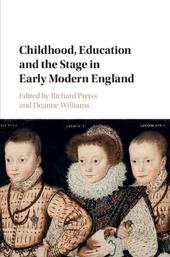
|
Childhood, Education and the Stage in Early Modern England
Paperback / softback
Main Details
| Title |
Childhood, Education and the Stage in Early Modern England
|
| Authors and Contributors |
Edited by Richard Preiss
|
|
Edited by Deanne Williams
|
| Physical Properties |
| Format:Paperback / softback | | Pages:308 | | Dimensions(mm): Height 229,Width 151 |
|
| Category/Genre | Shakespeare plays
Literary studies - general
Literary studies - plays and playwrights |
|---|
| ISBN/Barcode |
9781107476059
|
| Classifications | Dewey:822.3093523 |
|---|
| Audience | | Professional & Vocational | |
|---|
| Illustrations |
14 Halftones, black and white
|
|
Publishing Details |
| Publisher |
Cambridge University Press
|
| Imprint |
Cambridge University Press
|
| Publication Date |
23 June 2022 |
| Publication Country |
United Kingdom
|
Description
What did childhood mean in early modern England? To answer this question, this book examines two key contemporary institutions: the school and the stage. The rise of grammar schools and universities, and of the professional stage featuring boy actors, reflect the culture's massive investment in children. In this collection, an international group of well-respected scholars examines how the representation of children by major playwrights and poets reflected the period's educational and cultural values. This book contains chapters that range from Shakespeare and Ben Jonson to the contemporary plays of Tom Stoppard, and that explore childhood in relation to classical humanism, medicine, art, and psychology, revealing how early modern performance and educational practices produced attitudes to childhood that still resonate to this day.
Author Biography
Richard Preiss is the author of Clowning and Authorship in Early Modern Theatre (Cambridge, 2014) and editor of Shakespeare's The Tempest (2008). Deanne Williams is the author of Shakespeare and the Performance of Girlhood (2014). Her first book, The French Fetish from Chaucer to Shakespeare (Cambridge, 2004), won the Roland Bainton Prize from the Sixteenth Century Society and Conference.
Reviews'Childhood, Education, and the Stage in Early Modern England, edited by Richard Preiss and Deanne Williams, was one of the best collections of essays I read this year, drawing on recent critical interest in children's literature, and in the cultural history of children more broadly, to write new chapters on the theatrical history of the period, to redirect attention to the place of education in early modern society, and in this way to illuminate the complex thematic place that children occupy in the dramatic imagination of Shakespeare and his contemporaries.' SEL Studies in English Literature 1500-1900 'This volume makes a valuable contribution to the field of early modern childhood studies generally, and Renaissance drama more specifically, and paves the way for further work.' Katie Knowles, The Review of English Studies '... a rounded, impressively researched picture of children's varying roles in the realities and imaginaries of the period, shining a welcome light into several unchecked corners of this increasingly crowded field. Taken either separately or as a whole, the contributors pave the way for countless areas of future scholarly endeavour, establishing new directions and initiating conversations which, like the early modern children on whom they centre, are filled to the brim with exciting potential.' Harry R. McCarthy, Early Theatre 'The diversity of perspectives gives the volume multiple points of entry, which should appeal to readers from different disciplinary backgrounds. Students interested in the history of childhood in the early modern period, as well as those interested in the history of performing children more directly, will find much to admire here.' Marlis Schweitzer, Childhood in the Past '[This] wonderful edited collection brings together three major discourses - childhood, education, and theater - to demonstrate how these concepts 'grew up together in the early modern period' and to provide a 'new view of the literary and the social meaning of the young in early modern England'.' Edel Lamb, Renaissance Quarterly 'The essays in the volume are consistently excellent. Each is learned, meticulous, and original, making the volume as a whole a substantial contribution to scholarship, and individual essays offer valuable interventions in a range of fields including Shakespeare, Milton, and Marvell studies, and the history of the theater. ... scholars with many different preoccupations will find it repays their attention.' Elizabeth Hanson, Journal of the History of Childhood and Youth
|